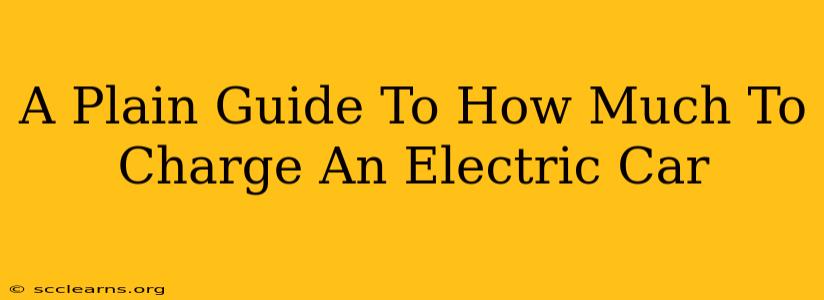Thinking about switching to an electric vehicle (EV)? One of the biggest questions on many people's minds is: how much will it cost to charge my electric car? This straightforward guide breaks down the factors influencing your charging costs and helps you estimate your expenses.
Understanding the Variables: What Affects Your EV Charging Costs?
Several factors contribute to the total cost of charging your electric car. Let's explore them:
1. Your Electricity Rate: The Foundation of Your Costs
Your electricity tariff is the most significant determinant. Electricity prices vary widely depending on your location, time of day (time-of-use plans), and your energy supplier. Check your electricity bill for your kilowatt-hour (kWh) rate. This is crucial because EV charging costs are directly tied to your kWh consumption.
2. Your EV's Battery Capacity: Size Matters
Electric vehicles come with different battery sizes, measured in kilowatt-hours (kWh). A larger battery capacity means a longer range but also requires more energy to fully charge. The battery size is printed in your vehicle's specifications. Knowing your EV's kWh capacity is essential for accurate cost estimations.
3. Charging Efficiency: Not All Charging is Created Equal
Not all charging methods are equally efficient. Level 1 (standard household outlet) charging tends to be less efficient than Level 2 (dedicated home charger) or Level 3 (DC fast charging) charging. Losses due to heat and conversion can vary slightly. While the difference isn't massive, it's worth considering for long-term cost calculations.
4. Your Charging Habits: How Often Do You Charge?
How often you charge significantly impacts your overall cost. If you only charge partially and frequently, you'll use less electricity than someone who consistently charges to 100%. Consider your daily driving habits and your typical charging patterns to refine your estimate.
Calculating Your EV Charging Costs: A Step-by-Step Guide
Let's put it all together with a simple calculation:
- Find your electricity cost per kWh: Look at your electricity bill.
- Identify your EV's battery capacity (kWh): Check your vehicle's specifications.
- Determine your charging efficiency: Assume around 85-95% efficiency for Level 2 charging and slightly less for Level 1.
- Calculate the cost per full charge: (Electricity cost per kWh) x (Battery capacity in kWh) / (Charging efficiency).
Example:
Let's say your electricity costs $0.15 per kWh, your EV has a 75 kWh battery, and your charging efficiency is 90%.
Cost per full charge: ($0.15/kWh) x (75 kWh) / 0.90 = Approximately $12.50
Important Note: This is a simplified calculation. The actual cost might vary based on your specific charging habits and any additional fees associated with your charging plan.
Beyond Home Charging: Public Charging Stations & Costs
Public charging stations offer convenience but often come with additional fees. These can vary significantly depending on the network, location, and charging speed. Some stations charge per kWh, others charge a flat fee per session, or even a combination of both. Always check the pricing information at the station before plugging in.
Minimizing Your EV Charging Costs: Smart Strategies
Here are some practical tips to reduce your EV charging expenses:
- Time-of-Use Plans: Explore time-of-use electricity plans that offer lower rates during off-peak hours.
- Optimize Charging Habits: Avoid fully charging your EV unless necessary.
- Utilize Off-Peak Charging: Charge your car overnight or during off-peak hours to take advantage of lower electricity rates.
- Consider Solar Power: Installing solar panels can significantly reduce or even eliminate your charging costs.
By understanding these factors and employing smart strategies, you can accurately estimate and effectively manage your electric car charging costs. Remember that while initial upfront costs might seem higher, the overall running costs of an EV are often significantly lower compared to gasoline-powered vehicles.

